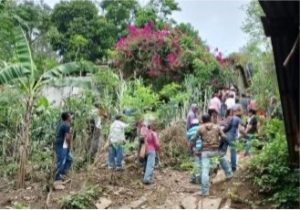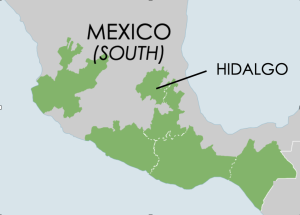 A group of 151 Christians from the Great Commission Baptist Church in Hidalgo state in southern Mexico, who were forced out of their villages on 26 April 2024 because of their religious beliefs, have been permitted to return home. Village leaders had cut off their electricity, vandalised their church building, blocked access to some homes and posted guards at the entry points to the neighbouring villages of Coamila and Rancho Nuevo in the municipality of Huejutla de Reyes.
A group of 151 Christians from the Great Commission Baptist Church in Hidalgo state in southern Mexico, who were forced out of their villages on 26 April 2024 because of their religious beliefs, have been permitted to return home. Village leaders had cut off their electricity, vandalised their church building, blocked access to some homes and posted guards at the entry points to the neighbouring villages of Coamila and Rancho Nuevo in the municipality of Huejutla de Reyes.
The displaced group, which includes over seventy children and babies, was first housed in a municipal building before being moved to a sports complex where the Baptists had to rely on local churches for food and were forced to use river water for bathing and drinking, resulting in many of them, especially children and the elderly, experiencing illness and infection.
Under an agreement brokered by state and municipal government officials between the displaced group and village authorities, electricity and water services have been reconnected to the Baptists’ homes and they have been given a set time period to compare the conditions of their homes and land with the conditions when they left them in April, with the right to access state aid programmes if needed. Under the terms of the agreement the government agreed to close a criminal investigation filed with the state prosecutor’s office into those responsible for the forced displacement and village authorities agreed to uphold freedom of religion or belief for all.
Sources told Christian Solidarity Worldwide that a new municipal government, which took office in September, prioritised the case and worked with Hidalgo State Secretary Guillermo Olivares Reyna and Religious Affairs Director Margarita Cabrera Román to find a solution.
Head of Advocacy at Christian Solidarity Worldwide Anna Lee Stangl commented, “The agreement brokered by the Hidalgo State and Huejutla Municipal governments, and agreed to by the Coamila and Rancho Nuevo authorities and the displaced religious minority community, serves as an example of what can be achieved, in terms of protecting freedom of religion or belief and upholding Mexican law, when there is political will and an investment of time and other resources on the part of the government. The process of return and reintegration will take time, and we will be watching to ensure that the local authorities follow through with their promise to respect freedom of religion or belief. We are encouraged by the government’s prioritisation of this case, and hope it represents the turning of a new page not just in the history of Huejutla de Reyes and these two communities, but in Mexico as a whole.”
Ongoing persecution
Recent events were an escalation of persecution suffered by the Baptists of Coamila and Rancho Nuevo since 2015, rooted in village leaders’ insistence that they convert back to Catholicism, although the municipal government denies that there is any link to religious freedom.
Church members have been detained, beaten, barred from accessing medical care, sacked from their jobs, prevented from burying their dead, had lands confiscated and crops destroyed, and their children have been banned from attending the local school. Several church members have been attacked.
Background
 In parts of Mexico, especially in mountainous regions of the southern states, the majority religion is a folk Catholicism that blends pre-Hispanic Mayan practices with Catholicism in a syncretic Christo-pagan religion. Community life centres on religious holidays that involve heavy drinking and pagan elements, and evangelical Christianity is viewed as an American religion.
In parts of Mexico, especially in mountainous regions of the southern states, the majority religion is a folk Catholicism that blends pre-Hispanic Mayan practices with Catholicism in a syncretic Christo-pagan religion. Community life centres on religious holidays that involve heavy drinking and pagan elements, and evangelical Christianity is viewed as an American religion.
In these regions pressure to participate in religious festivals has been an ongoing issue for many years. Evangelicals who choose not to participate or cannot afford to are fined or jailed, and if they still refuse they are denied services such as water and electricity and risk their church buildings and homes being burned and their belongings confiscated. Ultimately, the evangelicals are forced to leave the community.
Indigenous communities like Rancho Nuevo and Coamila are governed under Mexico’s Law of Uses and Customs, which protects their right to maintain traditional methods of local governance, but the Law is supposed to be applied in line with the constitution (which guarantees freedom of religion or belief) and the international conventions to which Mexico is party. In many communities, however, these protections are not upheld and state governments seldom intervene on behalf of religious minorities. Religious freedom violations are common in communities governed under the Law of Uses and Customs.
As well as the issue of refusing to participate in festivals, Mexican Christians of all denominations face persecution from drug cartels, which consider churches a threat because their leaders speak out against violence and criminal operations. Some pastors and priests have been kidnapped or killed and thousands face death threats and intimidation.
Read more about Mexican Christians in Church in Chains’ Mexico Country Profile.
(Christian Solidarity Worldwide, Church in Chains Mexico Country Profile, Evangelical Focus, International Christian Concern, Voice of the Martyrs Canada)
Photo: Christians displaced from Coamila and Rancho Nuevo (Christian Solidarity Worldwide)
Map: Adapted from Church in Chains Global Guide (4th Edition)
